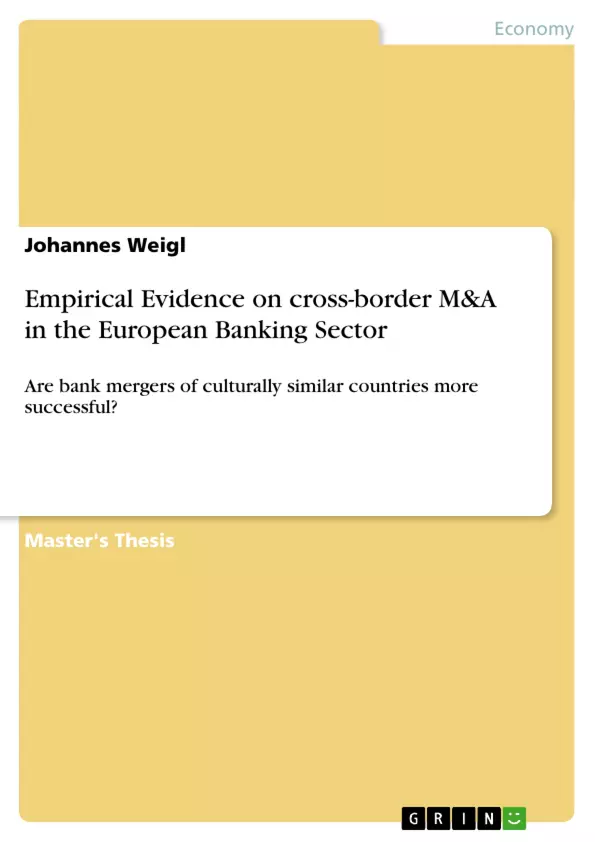Mergers and Acquisitions (abbreviated M&A) within the European financial market have altered the European banking sector drastically in the past couple of decades. Walkner & Raes (2005) claim that cross-border M&As have not been a major feature of the EU banking sector, implying that domestic bank mergers dominated the merger process for a long time.
From 1995 to 2006, the number of credit institutions decreased on average my approximately 7% in the eurozone, which was mainly driven by domestic merges.
However, since the mid of the 1990s cross-border M&As gained momentum and play a significant role in the European banking consolidation process. Nevertheless, “cross-border M&A has never come close to exceeding domestic mergers and acquisitions” (Kleimeier et al., 2007).
Despite the high level of M&A activity in Europe, relatively little research has been conducted dealing with cross-border M&As. Most of prior research applies event study methodology in order to analyze announcement effects of European bank M&As. Further, these studies focus on the question whether bank M&As in Europe have created or destroyed shareholder value. Others try to provide an in depth analysis of the factors that affect and may explain the value creation process. Altunbas et al. (2007) or Beitel et al. (2003) try to explain the M&A success in European bank mergers. However, the results often lack explanatory power.
Therefore, this thesis looks at the success of cross-border M&A from a different perspective.
The paper aims at understanding whether or not culture plays an important role in the success of M&As. Consequently, the study tries to identify cultural characteristics of bidder and targets, which have explanatory power for bidder returns and the combined effect of both bidder and target.
The thesis has several unique features. First, the study conducts an extensive short-term and long-term analysis on cross-border M&As. Second, the results of the event studies are tested by employing accounting studies as well. Third, the thesis provides a real life example of the merger between UniCredit and HypoVereinsbank.
This thesis is the first one, which extensively analyzes the following research question:
Are cross-border M&As of cultural similar countries more successful?
Inhaltsverzeichnis (Table of Contents)
- Introduction
- Data and Methods
- Data Sources and Construction of Variables
- Methods and Model Specification
- Results
- Cultural Dimensions and Economic Growth
- Power Distance
- Individualism vs. Collectivism
- Masculinity vs. Femininity
- Uncertainty Avoidance
- Long-Term Orientation
- Indulgence vs. Restraint
- Governance Indicators and Economic Growth
- Voice and Accountability
- Political Stability and Absence of Violence/Terrorism
- Government Effectiveness
- Regulatory Quality
- Rule of Law
- Control of Corruption
- Conclusion
Zielsetzung und Themenschwerpunkte (Objectives and Key Themes)
This study aims to explore the impact of cultural and governance factors on economic growth. It utilizes a large dataset of cross-country observations to examine the relationship between various cultural dimensions, governance indicators, and economic growth.- The role of cultural factors in economic growth
- The influence of governance on economic development
- The interplay between culture and governance in shaping economic outcomes
- The identification of key cultural and governance dimensions that significantly impact growth
- The provision of empirical evidence to support the theoretical arguments
Zusammenfassung der Kapitel (Chapter Summaries)
- Introduction: This chapter sets the stage for the research by outlining the importance of understanding the factors that drive economic growth. It introduces the key concepts of cultural dimensions and governance indicators and their potential impact on economic development.
- Data and Methods: This chapter delves into the data sources and methodologies used in the study. It explains the construction of variables, the selection of countries, and the statistical models employed to analyze the data.
- Results: This chapter presents the findings of the empirical analysis. It examines the relationship between cultural dimensions and economic growth, focusing on power distance, individualism vs. collectivism, masculinity vs. femininity, uncertainty avoidance, long-term orientation, and indulgence vs. restraint. It then investigates the link between governance indicators and economic growth, examining voice and accountability, political stability, government effectiveness, regulatory quality, rule of law, and control of corruption.
Schlüsselwörter (Keywords)
This study focuses on the relationship between cultural and governance factors and economic growth. Key concepts and terms include cultural dimensions, governance indicators, economic growth, cross-country analysis, empirical evidence, and statistical models.Frequently Asked Questions
What are the main drivers of M&A in the European banking sector?
The consolidation process is driven by the need for market efficiency, international expansion, and the impact of the single European financial market.
Does cultural similarity affect the success of cross-border mergers?
Research suggests that cultural characteristics of bidders and targets significantly influence shareholder value and the overall success of the integration process.
What are Hofstede's cultural dimensions in the context of M&A?
They include Power Distance, Individualism vs. Collectivism, Masculinity vs. Femininity, Uncertainty Avoidance, and Long-Term Orientation, which help explain behavioral differences in corporate cultures.
How do governance indicators impact economic growth and bank mergers?
Factors like the Rule of Law, Regulatory Quality, and Political Stability create a framework that determines the risk and potential return of cross-border investments.
What was unique about the UniCredit and HypoVereinsbank merger?
It serves as a real-life example of a large-scale cross-border merger in Europe, illustrating the practical challenges and successes of integrating different banking cultures.
- Quote paper
- Johannes Weigl (Author), 2008, Empirical Evidence on cross-border M&A in the European Banking Sector, Munich, GRIN Verlag, https://www.grin.com/document/196538



